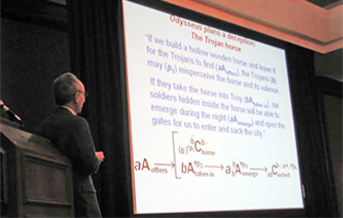
The Mechner Foundation has conducted and supported basic research in various areas of behavioral science. This work has been published in related journals and presented at conferences, and much of it is available on this website. The Foundation has also conducted courses and seminars, encouraged dialogue among related disciplines, and supported research through collaborative relationships with other institutions. Topics of the Mechner Foundation’s basic research activities include:
A major project is the application of a formal symbolic language for the analysis of behavioral contingencies to human affairs, including economics, environmentally impactful activity, finance, business, education, public policy, health, and clinical psychology. This formal language is an adaptation and generalization of the contingency language introduced in 1959 (Mechner, 1959, Journal of the Experimental Analysis of Behavior, 2, 133-150), which codifies behavioral contingencies unambiguously and with precision. The more recent generalized version of this language can be used to analyze and diagram all types of behavioral contingencies, including complex and dynamic ones involving multiple parties. It has uses in the specification of experimental procedures, analysis of various types of social interaction dynamics, economics, and law. Several principal publications explain the uses of the language.
Over a period of 12 years, the Foundation conducted a research program in its own laboratories, much of it based on Mechner’s “revealed operant” methodology. The studies focused on, among other topics: the role of reinforcement in learning; how certain learning history factors affect resurgence—the reappearance of behavior that was more prominent at a previous time; the conditions that produce resurgence or novel behavior; the effects, on choice, of biases due to participants’ pre-experimental histories, and other basic issues related to learning and performance.
Several of the Foundation’s research projects are relevant to learning and practicing any type of skilled performance. The phenomenon of resurgence in particular may be basic to an understanding of how performance errors are related to the way a skill was originally learned and practiced. Performance mistakes and undesirable behavior patterns that occur under certain conditions during skilled performance, especially conditions of stress, are often due to resurgence. The significance of this mechanism is explained and developed in Learning and Practicing Skilled Performance.
The revealed operant is Mechner’s research preparation, which permits certain characteristics of any individual occurrence of an operant to be conveniently recorded and studied. It is defined as a unit of operant behavior that is initiated and terminated by a recorded behavioral event. Techniques used in the Foundation’s research program to study revealed operants included lines drawn on a drawing tablet and sequences of keystrokes typed on a computer keyboard.
The Foundation also used the revealed operant technique in experimental studies on the effects of single reinforcer presentations on a stream of operant behavior. Research questions addressed included the role of the subject's history with respect to the reinforcer on the reinforcer’s effects. Another related area of basic research done by the Foundation involved the role of reinforcement in behavior shaping, the issue being whether reinforcer presentations produce a repetition of the preceding behavior or a perpetuation of its most recent direction of change.
Skill and knowledge, as evidenced in strategy games and other areas, are normally assessed by means of performance scores and practical results. The limitation of this type of assessment is that it can be confounded by emotional factors, lapses of concentration or attention, and stamina. The purpose of the proposed alternative, described in Mechner’s book review of Blindfold Chess by Hearst and Knott, is to provide a clean and general “Proficiency” measure of any type of knowledge and skill, and not only in games—one that provides a measure of the individual's level of uncertainty, in the information theory meaning of that term, and the speed with which the uncertainty is resolved. The review also compares seeing and visualizing in a novel way

